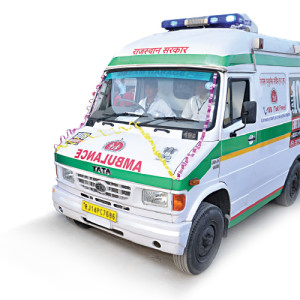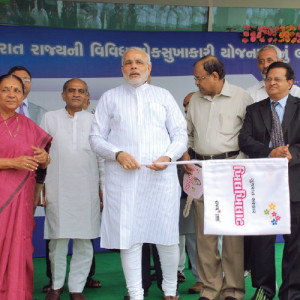

Director
GVK EMRI
In a candid interview with Kartik Sharma and Arpit Gupta of Elets News Network (ENN), K Krishnam Raju, Director, GVK EMRI, shares his opinion, vision and apprehensions with regard to ambulance services. With an increased focus on ambulance services by the state governments, GVK EMRI has learned the ropes of operating in a challenging environment at quite an early stage. And, it is now ready to grow the fleet to 14,000, as well as diversify into new areas of healthcare
GVK EMRI (Emergency Management and Research Institute) is doing a lot of work, especially in terms of public-private partnership (PPP), in Rajasthan along with the Government of Rajasthan. Can you please throw some light on what kind of initiatives are being undertaken? So far, we have been implementing 108 emergency ambulance service along with the Government of Rajasthan in the entire Rajasthan state. Currently, the Government of Rajasthan has initiated an integrated emergency health service. In this system, they have included not only 108, but also 104 ambulance service under the Janani Shishu Suraksha Karyakaram (JSSK) scheme. With the introduction of this scheme, we will be able to cater to all pregnancyrelated cases in Rajasthan. Hopefully, by the end of 1 year, we will definitely be able to show a good reduction in infant mortality rate (IMR) and maternal mortality rate (MMR).
 Additionally, the Government of Rajasthan has introduced the ambulances with the purpose to serve anybody for travelling from one hospital to another hospital, home to hospital, etc., which need not be an emergency or JSSK service. The State wants to cover in particular women and senior citizens to provide support. Moreover, with the allowance given by the Government to use any ambulance for any other service, the response time to the beneficiary will come down. As a result, we will be able to transport patients on time and definitely during the golden hour.
Additionally, the Government of Rajasthan has introduced the ambulances with the purpose to serve anybody for travelling from one hospital to another hospital, home to hospital, etc., which need not be an emergency or JSSK service. The State wants to cover in particular women and senior citizens to provide support. Moreover, with the allowance given by the Government to use any ambulance for any other service, the response time to the beneficiary will come down. As a result, we will be able to transport patients on time and definitely during the golden hour.

We all know that Rajasthan is such a large state with a lot of rural population. What kind of measures are being undertaken to overcome challenges related to operating in Rajasthan?
Earlier we were operating only 720 ambulances, but now onwards we plan to operate 1,400 ambulances. With the availability of double the number of ambulances now, even the rural population can be connected with the sheer increase in the number of the vehicles.
The IMR and MMR rates have always been a very big issue in Rajasthan. How far we will be able to address this challenge with the availability of such integrated systems? As such, we will be able to transport people, which can affect around 20 per cent of the population. However, for the remaining 80 per cent of the population, we need to appropriately equip hospitals with staff, beds and medical devices to take care of the patients. If these facilities are available right from the primary healthcare (PHC) level to other levels in the hierarchy, they will play a larger role in the reduction of IMR and MMR. Certainly, 20 to 25 per cent reduction is likely to be witnessed through an appropriate ambulance service. As a result of such a free ambulance service, the usual deliveries will definitely go up. There is a need to propagate the value of accessing such a service so that people use such an important service available for free.
Recently, we came to know about an incident, not in Rajasthan state, due to the scarcity of ambulances, people are being forced to carry dead bodies. Do you think there is less awareness about such ambulance services as being run by GVK EMRI?
If the dead bodies are carried in regular ambulances, such as 108 and 104 ambulances, people will start indulging in backlash. Ambulances like those being run by GVK EMRI are run for free for emergency and delivery purposes. Its high time that the Government must introduce mortuary ambulances. If enroute a person dies, then no one complains; however, transporting a dead person from home to the burial ground is not accepted.

| Government of Rajasthan – New Initiatives |
|
How important is public-private partnership (PPP) in improving the overall services of GVK EMRI? Do you think there is a need for a better plan to ensure business efficiency for private providers? PPP, as far as ambulance service, is concerned is really important as it can help the masses. Fortunately, our earning is not for profit, rather our main motto is to serve people.
 As such, GVK EMRI has its presence in 75 per cent part of the country and India is moving towards Digital India by integrating technology as a game-changer. How is GVK EMRI planning to adopt technology, especially to monitor operations and vehicles?
As such, GVK EMRI has its presence in 75 per cent part of the country and India is moving towards Digital India by integrating technology as a game-changer. How is GVK EMRI planning to adopt technology, especially to monitor operations and vehicles?
To monitor 11,000 ambulances, we need technology; therefore, we have introduced Global Positioning System (GPS) and adopted Google Maps. Additionally, we have supplied smartphones to all ambulances. Through such technological interventions, as well as a unique code provided to each ambulance, both location and movement of the ambulances can be monitored from Hyderabad. We have 46,000 people working across India and through technology we can monitor each associate. Additionally, our staff members keep everyone updated about the medical consumables consumed whenever they attend a particular case. As a result, this process enables to keep a check on the essential consumables to be replenished. Similarly, information related to the consumption of oxygen, position of medical devices and fleetrelated information, such as refueling processes, is also readily available.
As oil companies have agreed to the payment to headquarters, we do not pay to the petrol stations directly. Therefore, we invented the concept of petro card. We have introduced at all the petrol stations the facility of swiping the petro card. The data generated through such petro cards will go to the oil company. Every day we get the bills automatically from all the 17 states where we are operating our ambulances. Once the bills have been received, we make the payment from Hyderabad. Oil companies are quite happy with our initiatives.
| GVK EMRI – Key Takeawayss |
|
How is GVK EMRI planning to tackle emergency situations as recently we have witnessed strikes by your employees?
As such, strikes are not a new concept in India. On any given day, there will be a strike in one or other district of the country. However, the governments are comparatively much proactive than the earlier times and they supply nurses, paramedics, drivers, etc. during such situations to fill the void. Additionally, we transport manpower and other essential items from the neighbouring states, as well as take the help of the governments.
 You have been the leader in this segment for a long time. How do you envision the emergency services in India? What is the future of emergency services and scope for improvement in India?
You have been the leader in this segment for a long time. How do you envision the emergency services in India? What is the future of emergency services and scope for improvement in India?
As a matter fact, emergency services will increase with the development and increase in traffic and number of vehicles in the coming days. Currently, the Government of India supplies one ambulance for 1,00,000 people. In another 1 to 2 years, they have to make it one ambulance for 75,000 people and then in another decade, one ambulance for 50,000 people. By doing this, we will be able to save the Golden Hour and Reach Time, as well as save people in an effective manner.
Nowadays even heart transplants are being conducted in large numbers, for which the administration is also introducing the novel concept of Green Corridors/ Emergency Corridors to enable hassle-free rapid transportation of organs. Please provide details of the new initiatives being undertaken by GVK EMRI.
In Tamil Nadu, we are transporting blood using separate vehicles. Interestingly, we have also introduced mobile bikes and boat ambulances. Apart from India, we are also operating in Sri Lanka for emergency services. For the police, we are also operating dial 100 in three to four states. For women helpline 181, we are operating in six to seven states. For the first time in Telangana, we are introducing emergency services for animals by including 200 ambulances with veterinary doctors. We are also focusing on air ambulances.
Be a part of Elets Collaborative Initiatives. Join Us for Upcoming Events and explore business opportunities. Like us on Facebook , connect with us on LinkedIn and follow us on Twitter , Instagram.












